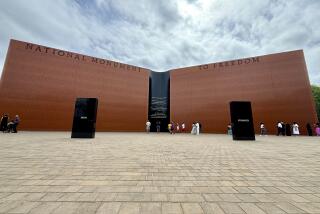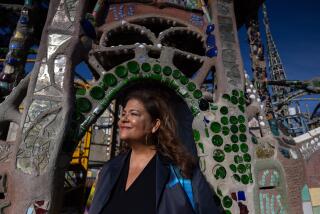In Jefferson’s view
- Share via
During Bill Clinton’s presidency, he frequently mentioned that he could look out the window of the Oval Office and enjoy a straight-line view of the Jefferson Memorial on the Tidal Basin. But where, I wondered as a biographer of that man from Monticello, was Jefferson looking?
I recently toured the National Mall, which allowed me to answer that question. Jefferson, in his ring of white marble columns, is looking across the waters of the Tidal Basin at the newly installed Martin Luther King Jr. Memorial, which was dedicated Sunday. The historical implications of this juxtaposition are rather significant.
Jefferson wrote the magic words of American history, the ones that begin, “We hold these truths to be self-evident, that all men are created equal.” When King delivered his “I Have a Dream” speech in August 1963, he did so on the steps of the Lincoln Memorial, honoring the man who ended slavery. But in his speech, King also said that he had come to collect on “a promissory note” written by Jefferson, alluding to those magic words, just as Lincoln had done 100 years earlier in the Gettysburg Address.
The full implications of Jefferson’s words took a very long time to become clear to us: Lincoln was the one who told us that they meant the end of slavery, and King was the one who told us that they meant racial equality. For this reason we can regard these three icons as an American trinity that embodies our creedal convictions in their 18th, 19th and 20th century versions.
But there is one glaring problem with this symbolic story. While Jefferson made several eloquent statements denouncing slavery as a moral travesty, he opposed any federal or state action to end it, at least in part because he did not believe that blacks and whites could live together once slavery was ended. And he held to that conviction because he believed that blacks were inherently, indeed biologically, inferior. He was at odds with the central premise of King’s reading of his words.
As Jefferson explained in “Notes on the State of Virginia,” the freed blacks would have to be shipped back to Africa or the Caribbean because the biological differences between blacks and whites were unsurmountable and “produce convulsions which will probably never end but in the extermination of one or the other race.”
The Mall is the semi-sacred space where what Lincoln called “the mystic chords of memory” play on everlastingly. And the location of the King Memorial introduces a new motif into the chorus. Jefferson was far ahead of his time on matters of human rights, but he was a man of his time on matters of race. His new neighbor now has the opportunity to bring him up to date on what his famous words have come to mean for us today, a daily reminder that he — and the new nation — was more prescient than he knew.
Joseph J. Ellis is the author of “American Sphinx: The Character of Thomas Jefferson.” He teaches history at Mount Holyoke College in South Hadley, Mass. His book “Revolutionary Summer,” on the summer of 1776, is due in 2012.
More to Read
A cure for the common opinion
Get thought-provoking perspectives with our weekly newsletter.
You may occasionally receive promotional content from the Los Angeles Times.









